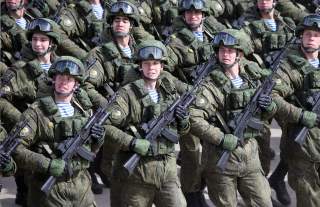Russia Plans to Use Soldiers' "Genetic Passports" to Determine Their Jobs
What?
“It is a question of understanding at the genetic level who is more prone to, for example, to service in the fleet, who may be more prepared to become a paratrooper or a tankman.”
Want to be a Russian paratrooper or tank commander? Then you’d better hope you have the right genes.
The Russian military will be assigning soldiers based on their “genetic passports.”
“The project is far-reaching, scientific, fundamental,” Alexander Sergeyev, the chief of Russia’s Academy of Sciences, told Russian news agency TASS (English translation here). “Its essence is to find such genetic predispositions among military personnel, which will allow them to be properly oriented according to military specialties.”
(This first appeared in July 2019.)
“It is a question of understanding at the genetic level who is more prone to, for example, to service in the fleet, who may be more prepared to become a paratrooper or a tankman.”
Advances in medical technology are making genetic testing a common medical procedure. It is used to detect genetic diseases such as cystic fibrosis, or the risk of developing certain diseases such as colorectal cancer. Pregnant women can also choose to be tested to determine whether their baby has genetic abnormalities such as Down syndrome.
But Russian President Vladimir Putin has embraced genetics with a passion. In March, the Kremlin issued a decree that called for “implementation of genetic certification of the population, taking into account the legal framework for the protection of data on the personal human genome and the formation of the genetic profile of the population.” Ostensibly this is to protect Russia’s population against chemical and biological attack, as well as safeguard Russia’s genetic patrimony from Western spies and saboteurs.
It has also spurred fears that Russia is edging towards a Nazi-style eugenics program in which certain groups, such as those Russians of Slavic ancestry, will be favored.
Either way, the Russian military will be using genetics to assess that most unpredictable of human qualities: how a person will react in combat. “The project involves not only the assessment of the physiological state, but also the prediction of human behavior in stressful, critical situations that are associated with the military profession,” says Sergeyev, Russia's chief scientist. “Resistance to stress, the ability to perform physical and mental operations under the conditions of this stress, and so on—all this may be contained in a soldier’s genetic passport.”
It is not just soldiers who will be genetically profiled. In December 2018, another Russian scientist announced that cosmonauts will be tested. “The first area is the research into the human’s genetics from the viewpoint of using it in the selection [for the cosmonaut program], said Lyudmila Buravkova, deputy director of the Institute of Medical and Biological Problems at the Russian Academy of Sciences. “The second area is the attempt to remedy genetic errors as much as this should be done before a flight.”
To be clear, many militaries use some kind of testing, such as the U.S. military’s Armed Services Vocational Aptitude Battery (ASVAB), to determine whether someone is qualified for military service, and whether they are suitable for certain positions such as technical jobs. The U.S. military collects DNA from soldiers to identify their bodies if they are killed. The Defense Health Agency told the National Interest that the U.S. military does not use genetic testing to assign personnel.
That’s not surprising, given that genetic testing would certainly raise concerns over privacy and racial profiling. A civil rights issue that isn’t likely to be a cause of furor in an authoritarian society like Russia.
The bigger question is whether an army can decide whether someone is better suited to be a pilot, a rifleman or a cook based on their genetic profile.
Michael Peck is a contributing writer for the National Interest. He can be found on Twitter and Facebook.
Image: Wikimedia.

